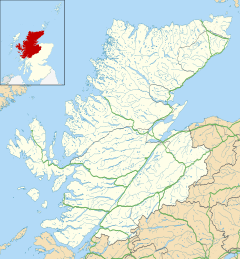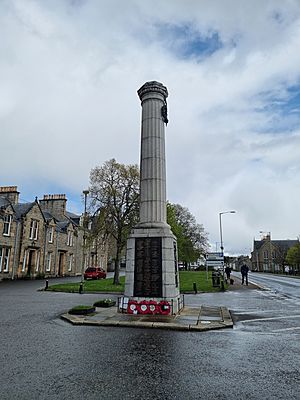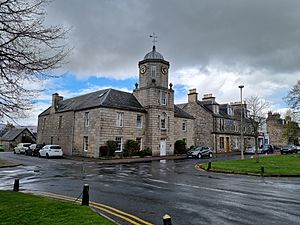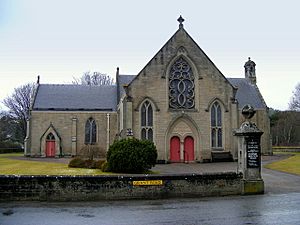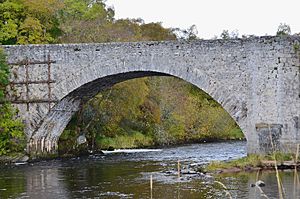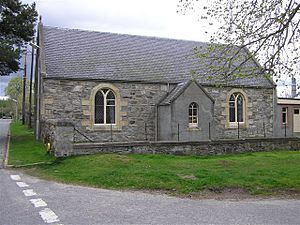Grantown-on-Spey facts for kids
Quick facts for kids Grantown-on-Spey
|
|
|---|---|
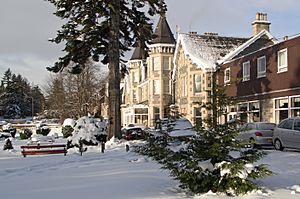 A winter scene in Grantown-on-Spey |
|
| Area | 1.30 km2 (0.50 sq mi) |
| Population | 2,510 (2020) |
| • Density | 1,931/km2 (5,000/sq mi) |
| Language | English |
| OS grid reference | NJ031276 |
| • Edinburgh | 96 mi (154 km) |
| • London | 426 mi (686 km) |
| Council area | |
| Lieutenancy area | |
| Country | Scotland |
| Sovereign state | United Kingdom |
| Post town | Grantown-On-Spey |
| Postcode district | PH26 |
| Dialling code | 01479 |
| Police | Northern |
| Fire | Highlands and Islands |
| Ambulance | Scottish |
| EU Parliament | Scotland |
| UK Parliament |
|
| Scottish Parliament | |
| Website | http://www.grantownonline.com |
Grantown-on-Spey (which is Baile nan Granndach in Gaelic) is a lovely town in the Highland Council Area of Scotland. It's found on a flat area next to the River Spey, right at the edge of the amazing Cairngorm Mountains. It's about 32 kilometres (20 miles) south-east of Inverness.
The town was started in 1765 as a "planned settlement." This means it was carefully designed and built from scratch. It was first called Grantown, named after Sir James Grant. Later, in 1898, the local council added 'on Spey' to its name. Grantown-on-Spey has many old buildings from the 1700s and 1800s. It's a popular spot for tourists and offers many services in the Strathspey region.
Grantown-on-Spey is also "twinned" with Notre-Dame-de-Monts in France. This means the two towns have a special friendship and often share cultural events.
Contents
History of Grantown-on-Spey
Grantown-on-Spey was founded in 1765. This was during a time when new ideas were changing how people lived and worked. The town was built to help local farming and crafts. It also aimed to create jobs and stop people from moving away. This was part of a bigger plan by landowners to improve society after a long period of peace.
Sir James Grant used his own money to build the town. He chose a spot about a mile from Castle Grant. The town was designed with a large marketplace called the Square. The High Street led away from it. Old Grantown, a small village nearby, was taken down to make way for the new town. A local stream, Kylintra Burn, was moved to provide water. People were invited to move to the new town, which was close to farms, forests, and quarries.
The town officially opened on June 12, 1766, with a big party. By 1768, the first buildings were up. By 1787, over 300 people lived there. To help businesses, Sir James Grant built small factories, including places for making linen cloth. New roads, bridges, a town hall, and a jail were also built.
By 1800, the town needed a new church. Inverallan Church was built in 1803. It replaced older churches, some dating back to medieval times. The church was rebuilt in the 1880s. By 1841, the town had 1,000 people. In the 1860s, linen making slowed down. Grantown became a market town for local farms. Then, in the late Victorian era, tourism started to grow.
Queen Victoria and Prince Albert even stayed a night at the Grant Arms Hotel in 1860. An entry from her diary about this visit is still on display there. In 1863, Grantown had many shops, banks, and hotels. The Strathspey Railway also opened. In 1898, the town officially became a Burgh, and 'on Spey' was added to its name.
By 1900, the High Street was full of shops. These included an ironmonger, newsagent, and clothes shops selling tartan and tweed. Tourism grew a lot in the 20th century and still helps the town today.
The town's war memorial for the First World War was put up in 1921. It's a granite column. Names of those lost in the Second World War were added in 1945.
In 1965, the town had almost 1,600 people. It could host 800 visitors. In 2015, Grantown celebrated its 250th birthday with parties and a picnic. In 2016, a special event honored the town's history of linen making.
What Grantown-on-Spey is Like Today
Local Economy and Jobs
The main jobs in Grantown-on-Spey are in farming, forestry, and tourism. Many hotels offer guided tours to see local wildlife. People enjoy birdwatching, spotting red squirrels, and seeing sea life on the nearby coast. The beautiful landscapes of the Cairngorms National Park are also a big draw.
You can find several whisky distilleries nearby. This includes the new Cairn Distillery. There's also a large meat processing plant called Millers' of Speyside. The main office for the Cairngorms National Park Authority is in town too.
Places to Stay
Grantown-on-Spey has many hotels, bed and breakfasts, and self-catering places. There is also a large caravan park run by the Caravan and Motorhome Club.
Important Buildings and Places
Museums and Historic Buildings
The Grantown Museum is on Burnfield Avenue. It used to be the Grantown Female School, built in 1861. The school closed in 1890, and the building became the museum. Next to the museum is a Bell tower with the old town bell.
The Speyside Orphanage was started in 1795 to help children. It was rebuilt in 1824 after a fire. It closed in 1975 and is now private apartments. This building is very important historically and has a small clock tower.
The High Street and the Square have many beautiful old buildings. These include former banks and the old Post Office. Some buildings are in the Scottish baronial architecture style, which looks like old castles.
Many hotels in town have a long history. The Ben Mhor hotel dates back to the 1880s. The Grant Arms Hotel was built in 1765 and hosted Queen Victoria. The Garth Hotel, built in 1769, was first a private home before becoming a hotel.
The Royal British Legion building on the Square is an Art Deco style building. It used to be a cinema from the 1920s to the 1960s.
Community Facilities
The Ian Charles Community Hospital is a local hospital in Grantown-on-Spey.
Anagach Woods is on the edge of town. It has many walking trails. It's home to a rare bird called the capercaillie. These birds are very shy, so it's important not to disturb them.
Churches in Grantown-on-Spey
Grantown-on-Spey has several churches. None of them have burial grounds.
Inverallan Parish Church (Church of Scotland) is on Mossie Road. The current church was rebuilt in 1886. It has a Victorian Gothic style. It includes old carvings and woodwork from the 1600s.
There is also a Baptist church and a church shared by two groups: Scottish Episcopalian (St Columba) and Roman Catholic (St Anne).
Cemeteries
There are two cemeteries near Grantown-on-Spey. Both are looked after by the Highland Council.
- Inverallan is the older burial ground. It's only used for existing family plots now. It's located between the River Spey and Inverallan House.
- Grantown Cemetery (also called the New Cemetery) has been used since the early 1900s. It's south of Grantown, between the B9102 and A95 roads.
Getting Around Grantown-on-Spey
Road Travel
The town was built along an old military road. This road connected places like Boat of Garten and Inverness. Today, these are the A95, B9102 (High Street), and A939 roads.
The Old Spey Bridge is on the south-eastern edge of Grantown. It was built in 1754 as part of a military road. It has three arches. A new, modern concrete bridge was built in 1931 for cars. The old bridge is now used only by people walking or cycling.
Train Services
There are no train services directly to Grantown-on-Spey anymore. The closest main train stations are Aviemore and Carrbridge. From there, trains go north to Inverness and south to other parts of Scotland.
Grantown-on-Spey used to have trains until the 1960s. The Inverness and Perth Junction Railway opened in 1863, bringing more tourists. There were two stations: Grantown-on-Spey East and Grantown-on-Spey West. Both closed to passengers in 1965.
The Strathspey Railway is a special heritage train line. It runs between Aviemore and Broomhill. Work is being done to extend this line back to Grantown.
Bus Services
Local buses run in and around Grantown-on-Spey. Many services go to Aviemore. Some buses only run on school days.
You can also find occasional buses to the Cairngorm Mountain Railway, especially for skiers in winter. Longer distance buses are available from Aviemore, Elgin, and Keith.
Education in Grantown-on-Spey
The first school in Grantown was planned in 1765. It was built in 1767. The school grew over time. The older students eventually moved to the current Grantown Grammar School. This school opened in a new building in 1975. It teaches students aged 11 to 18. Grantown Primary School is still on the site of the older school, in a newer building.
The Speyside Charity/Free School and the Grantown Female School were also important schools in the past. Their buildings are now used for other things.
Sports and Activities
Grantown-on-Spey golf course was created in 1890. It started with nine holes and was later made into 18 holes. A famous golfer named Bobby Cruickshank was a member here.
The Craig MacLean Leisure Centre is a public sports center in town. It has a swimming pool and a gym.
Famous People from Grantown-on-Spey
- Aung San Suu Kyi, a politician from Myanmar.
- Bobby Cruickshank, a well-known golfer.
- Craig MacLean, a famous track cyclist.
- John Kerr, Baron Kerr of Kinlochard, a diplomat.
- Isabella Leitch, a nutritionist born in 1890.
Images for kids
 | Tommie Smith |
 | Simone Manuel |
 | Shani Davis |
 | Simone Biles |
 | Alice Coachman |


